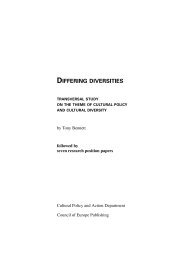Why we need European cultural policies: the impact of EU ...
Why we need European cultural policies: the impact of EU ...
Why we need European cultural policies: the impact of EU ...
You also want an ePaper? Increase the reach of your titles
YUMPU automatically turns print PDFs into web optimized ePapers that Google loves.
inherited problems and challenges <strong>of</strong> overcoming <strong>the</strong> transition crisis, <strong>the</strong>re has been pressureto reduce public spending, to privatize state-owned companies and to undertake o<strong>the</strong>r reformsnecessary to achieve a functioning market economy.It is still too early to see many specific changes in <strong>cultural</strong> <strong>policies</strong> that have resulted from <strong>the</strong>economic reforms and <strong>the</strong>re have been very few areas in which <strong>the</strong>re have been explicit requestsfor reforms in <strong>the</strong> <strong>cultural</strong> field. To sum up: <strong>the</strong>re is still almost no information about <strong>the</strong> effects <strong>of</strong><strong>the</strong> enlargement on culture, o<strong>the</strong>r than <strong>the</strong> assessment <strong>of</strong> <strong>the</strong> funding programmes.92General conclusions from <strong>the</strong> existing literature and from <strong>the</strong> responses to <strong>the</strong> questionnaireshow that <strong>the</strong>re has been, ho<strong>we</strong>ver, an <strong>impact</strong> <strong>of</strong> some kind on <strong>cultural</strong> <strong>policies</strong>: sometimespositive, sometimes negative.Cultural changes at several levelsGenerally speaking, changes influenced by accession to <strong>the</strong> <strong>EU</strong> have been and are taking placeat two levels.First, accession has required in some areas, direct reform <strong>of</strong> national <strong>cultural</strong> policy. These havebeen visible and easy to assess, as with audio-visual or copyright policy. In <strong>the</strong>se circumstances,because <strong>the</strong> influence <strong>of</strong> accession has been ei<strong>the</strong>r exclusively focussed on a <strong>cultural</strong> topic,or because certain regulations could have been predicted to impinge on <strong>cultural</strong> <strong>policies</strong>, thisinfluence has in some ways taken <strong>the</strong> concerns <strong>of</strong> <strong>the</strong> <strong>cultural</strong> sector into consideration. Ho<strong>we</strong>ver,even in those examples, <strong>the</strong> short-term effects <strong>of</strong> <strong>the</strong> reforms may have been positive or negative;it is unlikely that <strong>the</strong>re could ever have been a `one-size-fits-all’ solution.Indirect changes <strong>we</strong>re, ho<strong>we</strong>ver, more difficult to identify and assess. Any <strong>impact</strong> <strong>the</strong>y may havehad – whe<strong>the</strong>r positive or negative – has lagged behind <strong>the</strong> more direct reforms. They hardly tookaccount <strong>of</strong> <strong>the</strong> concerns <strong>of</strong> <strong>the</strong> <strong>cultural</strong> sector, and have been able to override <strong>the</strong> principle <strong>of</strong>subsidiarity or <strong>the</strong> exclusion <strong>of</strong> <strong>the</strong> <strong>cultural</strong> field from harmonization.Evidence from <strong>the</strong> questionnaireThe questionnaire’s results pointed to some <strong>of</strong> those direct and indirect changes in <strong>cultural</strong> policy,which occurred in <strong>the</strong> new member states or is taking place now in <strong>the</strong> candidate countries, thatis, those which are in <strong>the</strong> process <strong>of</strong> negotiating to join.Those which <strong>we</strong>re in some ways easiest to identify <strong>we</strong>re <strong>the</strong> audio-visual sector and intellectualproperty rights (IPR), as <strong>the</strong>y <strong>we</strong>re both covered by <strong>the</strong> acquis communautaire and <strong>the</strong>re <strong>we</strong>reincentives and guidelines for new member states and some technical assistance. It was clear,ho<strong>we</strong>ver, that even here, <strong>the</strong> <strong>impact</strong> <strong>of</strong> accession to <strong>the</strong> <strong>EU</strong> could not be separated from <strong>the</strong>general reforms which ensued as <strong>the</strong>se countries transformed <strong>the</strong>mselves in <strong>the</strong> wake <strong>of</strong> <strong>the</strong> fall <strong>of</strong>communism. For example, to assess <strong>the</strong> <strong>impact</strong> <strong>of</strong> accession in <strong>the</strong> field <strong>of</strong> IPR was complicatedby <strong>the</strong> fact that <strong>the</strong> transition countries <strong>we</strong>re already having to align <strong>the</strong>ir legislation with o<strong>the</strong>rinternational regulations from WIPO and <strong>the</strong> WTO. Never<strong>the</strong>less, <strong>the</strong>re was data available.Preliminary assessment <strong>of</strong> <strong>the</strong> <strong>impact</strong> <strong>of</strong> <strong>EU</strong> enlargement63














